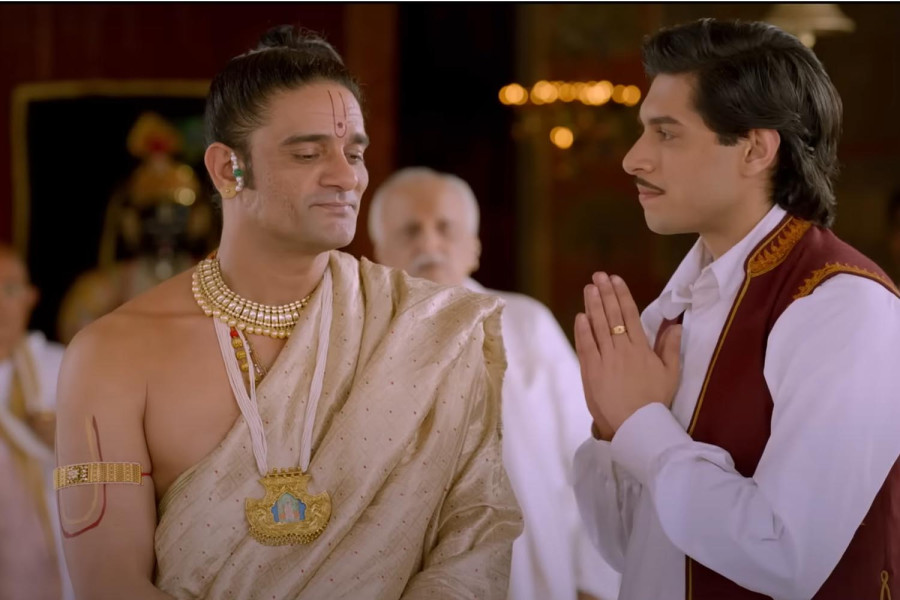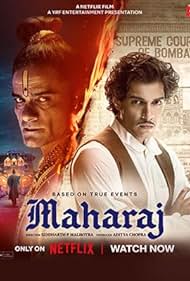Movies
Faith, justice and the power of the press
‘Maharaj’ tells the true story of a journalist Karsandas Mulji and his fight against the corrupt practices of a spiritual leader.
Rishika Dhakal
Set in a time when Kolkata was Calcutta, Mumbai was Bombay, and India was still under British rule, ‘Maharaj’ portrays the real-life story of Karsandas Mulji.
In the movie, debuting actor Junaid Khan portrays Mulji as a journalist, social reformer, and administrator. It explores the clash between the progressive Mulji and the traditionalist Jadunath Maharaj (Jaideep Ahlawat), a spiritual leader of the Vaishnava sect who took advantage of female devotees under the guise of seva (service).
The film is based on the historic Libel Case of 1862, which was heard in Bombay's Supreme Court. It illustrates the circumstances that led to this case and its current importance. The story of ‘Maharaj’ starts with the happy birth of Karsan Das. But, this joy is short-lived as Das's mother passes away after only ten years.
Das relocates to Bombay, also called the metropolis of seven islands, where his maternal uncle resides. In the past, Bombay was given to an English king as a dowry and developed into a centre for Gujarati cotton traders. The narrative jumps ahead when Das reaches marriageable age and gets ready to tie the knot with his longtime sweetheart, Kishori (Shalini Pandey).
Unlike typical Bollywood narratives, the couple experiences a happy marital union at the very start. However, this leaves viewers anticipating a potential twist that could threaten their blissful relationship. And the anticipation proves correct. Kishori becomes entangled with the demigod Jadunathji, also known as JJ.
JJ is the highest-ranking leader among Bombay’s seven Haveli leaders. He is believed to be a descendant of Lord Krishna and is highly respected. As political thinker Thomas Hobbes said, “The words of the king are the laws to be abided by everyone,” which shows JJ’s authority over his followers.
Similarly, JJ’s words were treated with the utmost respect. However, the devotees needed to discern the thin line between devotion and fanaticism.
Faith-obsessed, Kishori displays no pain when JJ spills colour over her chest during Holi. This is interpreted as JJ inviting Kishori to conduct Charan Seva in the selected role.

In the world of JJ, having sex with young girls while others are watching is known as Charan Seva. “On her wedding night, the newlywed bride must come to the Haveli to receive blessings,” he declares. As anticipated, Das catches Kishori and JJ red-handed. Consequently, he ends his relationship with her.
It can be annoying how women are consistently portrayed as supporting or unimportant roles in the film. But when you look at the movie with an eye toward historical authenticity and acknowledge that it is based on actual events, it becomes a compelling watch.
When Kishori witnesses JJ luring her younger sister, she finally realises the truth. This incident calls into question Kishori's integrity: Did envy make her see through JJ's lies?
In a swift turn, Karsan Das is expelled from his home after breaking his engagement with Kishori. Overwhelmed by the shame and dishonour cast upon her, the once bubbly and lovely Kishori tragically takes her own life.
The directors cleverly introduce Viraaj (played by Sharvari) to console the audience after Kishori's tragic death. However, her role feels out of place, as she has no significant purpose by the movie’s end.
Still, the loud presence that she brings to the screen with her acting chops is praiseworthy.
Karsan Das turns to the press to expose JJ's wrongdoings. As a fervent and radical writer, he decides to fight JJ with the power of his words. Consequently, he publishes articles against JJ.
In response, JJ Maharaj files a defamation lawsuit against Das. The two main characters in the film adopt modern fighting styles, illustrating the significant influence media and language have on us.
As a law student, I noticed that JJ's trust in the court shows that everyone is equal under the law. It also emphasises the importance of legal institutions in ensuring things are fair and people are held responsible.
English men with periwigs advocating in favour of Indians present both irony and delight to the audience. The theatrical shouting of the British advocates adds gravity to the film, which otherwise needs a compelling storyline to convey the message it wants to impart.
The film's main characters try to help JJ understand his wrongdoing by using hypothetical situations where his sister or mother is mistreated. This approach raises an important question: Should we relate a crime to a victim being someone's daughter or sister to explain why it's wrong? The film is influenced by this idea.
The movie's intention deserves praise, but preachy dialogues and theatrical elements undermine its impact. On the bright side, Junaid Khan’s performance in this ambitious movie is a testament to his bright future in the movie industry if he continues to choose roles that craft and hone his talent.
The movie's message—that one can connect with one's faith without a mediator—is a satire for today's self-proclaimed gurus, who often twist religious texts to fit their agendas and vision.
Overall, ‘Maharaj’ is highly relevant for anyone understanding faith. In an era increasingly influenced by bhakt Culture, this movie arrives just in time to preserve the essence of true religion.
—
Maharaj
Director: Siddharth P Malhotra
Starring: Junaid Khan, Shalini Pandey, Sharvari
Duration: 131 minutes
Language: Hindi
Available: Netflix
Year: 2024




 15.87°C Kathmandu
15.87°C Kathmandu











